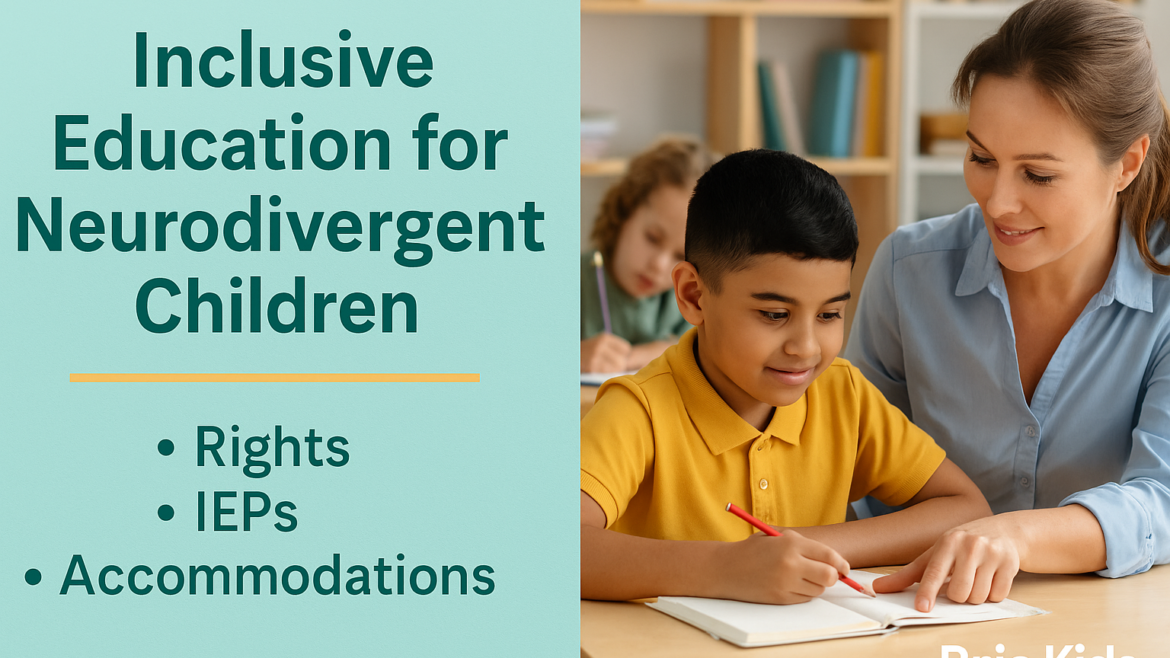1. Can Neurodivergent Kids Attend Regular School?
Absolutely. In India, children with autism, ADHD, dyslexia, and other neurodivergent conditions have the legal right to attend mainstream schools.
- The RPWD Act (2016) and the RTE Act guarantee admission and require schools to provide reasonable accommodations.
- CBSE and many state boards actively support inclusive education India, encouraging modified practices so every child can learn alongside peers.
If a school hesitates, remember: You have legal rights. You just need the knowledge and the confidence to use them.
2. What Is an IEP and Why It Matters
An Individualized Education Plan (IEP) is a tailored roadmap created to support a neurodivergent child’s learning journey.
An IEP includes:
- Academic goals suited to the child’s abilities (e.g., speech, reading, math)
- Support services like speech therapy, occupational assistance, or counseling
- Evaluation timelines to monitor progress
- Roles and responsibilities of teachers, parents, and specialists
IEPs are essential for children with autism, ADHD, learning disabilities, and others. At Brio Kids, we help parents prepare documentation and suggest suitable strategies to share with schools—making the IEP process smoother and more effective.
3. Types of School Accommodations for ADHD and Autism
Accommodations help level the playing field without altering learning content. Here are some options commonly used in inclusive classrooms:
- Academic: Extra time on exams, simplified instructions, oral assessments
- Behavioral: Visual schedules, reward charts, cue cards
- Sensory: Noise-canceling headphones, fidget tools, flexible seating
- Environmental: Front-row seating, quiet/low-light corners, reduced visual distractions
At Brio Kids, we offer pdf guides for parents to share with schools, explaining how accommodations like a “sensory corner” or short movement breaks can boost concentration and calm.
4. What to Do if the School Doesn’t Cooperate
Not all schools are immediately inclusive—but there are steps you can take:
- Talk to the Principal or Counselor
Share your child’s assessment and explain why accommodations are needed. - Request a Formal IEP Meeting
Invite teachers, specialists, and Brio Kids coaches (if applicable) to discuss goals. - Escalate if Needed
Contact the school board, district education officer, or file a complaint under the RPWD/RTE Acts. - Seek Professional Support
Organizations like Action for Autism and Vidya Sagar can provide legal advice and mediation. - Use Brio Kids’ Sample Templates
We offer formal request letters and IEP formats that parents can submit directly to schools.
5. How Brio Kids Empowers Families
At Brio Kids, we believe parents are the heart of inclusive education. Our resources include:
- IEP Designer Tool: Helps parents build IEP goals aligned with school standards
- Accommodation Packs: Easy-to-download PDFs explaining popular classroom tools
- Parent Workshops: Live sessions on navigating school systems and advocating for children
- School Communication Guides: Templates and tips for meaningful parent-teacher dialogue
These tools help parents feel informed, heard, and empowered—so no child is left behind.
✅ Final Takeaway
Inclusive education in India isn’t just a noble idea—it’s a legal and moral obligation. With the right tools and support, your child can thrive in a regular classroom.
Accessibility starts with you. Use your rights, get an IEP for autism or ADHD, ask for necessary school accommodations, and bring partners like Brio Kids along. Together, we can create classrooms where every learner belongs.

